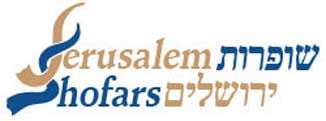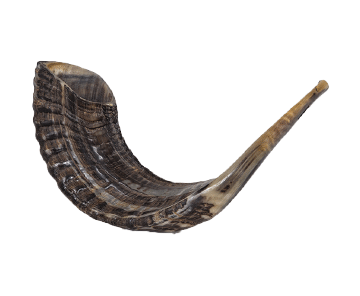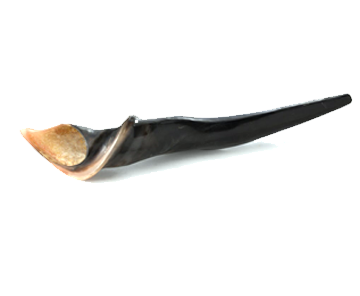Does the shofar sound hoarse? Do you find it hard to blow? Then you probably need to clean it.

How to clean a shofar
Before blowing the shofar it is recommended to have it cleaned, because oftentimes the dirt inside causes poor and hoarse sounds. It is recommended to wipe [the inside] with a cotton cloth moistened in alcohol. Most of the dirt accumulates inside the nozzle. It is recommended to clean it with a cotton ball. For quick cleaning, a small amount of alcohol can be poured into the nozzle and then shaken a few times. By doing this, the sound improves dramatically.
Shofars are the most frequently mentioned musical instruments in the Bible
Shofars are the most frequently mentioned musical instruments in the Bible (72 times). Shofars had been used for different purposes during Biblical times, for example they were blown while transporting the Ark of the Covenant (Samuel II 6:15), for announcing the new moon at the beginning of the month (Psalms 81:4), on Yom Kippur (Leviticus 25: 9), etc.
When do we blow the shofar?
There is a mitzvah to blow the shofar on Rosh Hashanah, on the Yom Kippur of the jubilee year (for releasing slaves), on fast days and in times of trouble. It is customary to blow the shofar by the end of Yom Kippur, and at the end of the morning services during the month of Elul. Sephardim also blow the shofar when reciting the thirteen attributes of mercy during slichot services and for the kadish titkabel which follows. The shofar is not blown on the eve of Rosh Hashanah.
Shofars at the King’s service.
Shofars had been used for other purposes as well. For instance, for crowning a king (Samuel- Kings), for declaring wars, for recruiting soldiers, for declaring victory (Judges 4:6), etc. We read in the Bible that on several occasions it is permitted to blow the shofar in spite of a general ban on playing musical instruments during the mourning period for the destruction of Temple. It should be mentioned that a full orchestra used to play at the Temple and possibly this ‘primitve’ instrument was played along as well. Today the shofar continues to be blown to announce the New Year and the new month, and at some locations it is blown to herald the beginning of the Sabbath.
Are shofars primitive instruments?
Shofars are such primitive musical instruments that even today in the age of high-tech they stir excitement in every Jew’s soul and bring him back to his roots. The Torah commands us to hear the sound of the shofar. Shofar in Hebrew means “hollow” and it may imply that an empty vessel becomes important only when breath blows through it, when there is intervention from the ‘Supreme Power’.
The shofar on Rosh Hashanah
The same shofar blasts which announce the beginning of the New Year, are also a sign to wake us up to the call of repentance. The second context in which the shofar is blown on the morning of Rosh Hashanah is related to the binding of Isaac by his father Abraham prior to offering him as a burnt sacrifice. Instead of sacrificing his son Abraham avinu sacrificed the ram caught by its horns in the thicket. As mentioned above, hearing the shofar is a mitzvah on this day, and therefore the most prominent feature of the holiday. There is a lot of symbolism associated with a shofar’s koshrus. The shofar used on Rosh Hashanah should be a hollow instrument, in its natural form. The sounds produced by human exhalation, remind us of G-d blowing a living soul into human-kind.
The finest shofar is made from a ram horn. It recalls the great sacrifice Abraham was willing to make when he was ready to sacrifice his most precious son.
Shofars for other events
Today more and more people celebrate personal events integrating shofar blasts into their celebrations; like weddings, Bar Mitzvahs at the Western Wall, etc. Shofars enhance the ceremony and usually herald the start of the event or the entry of the bride and the groom.





